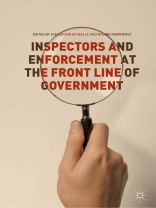This book explores the social dynamics of the interaction between inspectors and their inspectees in the public sector. Government inspectors have a crucial role in enforcing rules and standards. The role of inspectors has changed. Their task is no longer to merely inspect and enforce, but also to educate, to negotiate, and to make compromises. Their decisions come about as a result of an interaction with inspectees: Do I punish or do I let go? Do I negotiate or do I issue a fine? Do I believe what this inspectee is telling me? Using insights from public administration, regulation and sociology, this book looks at the daily work of a diverse group of inspectors such as tax inspectors, veterinary inspectors, school inspectors, environmental inspectors or health inspectors.
Table of Content
Introduction: The social dynamics of daily inspection work.- Studying uncertainty in decision making by street-level inspectors.- Inspectors as information-seekers.- Are you a true offender? Bus ticket inspection as deviance enactment.- Strict enforcement or responsive regulation? How inspector-inspectee interaction and inspectors´ role identity shape decision making.- Dynamics of inspectors’ enforcement styles.- Power dynamics and power asymmetries in the interaction between street-level inspectors and inspectees.- Stimulating collaboration and cooperation in tax inspection.- Welfare fraud inspectors between standardization and discretion.- Collective discretionary room: How inspectors decide with providers and citizens.- A micro-level perspective on joint inspections: how teamwork shapes decision making.- The decision made. On the inspection encounter.
About the author
Steven Van de Walle is Professor of Public Management at the Public Governance Institute, KU Leuven, Belgium. His research focuses on public sector reform and service interactions between citizens and government.
Nadine Raaphorst is Assistant Professor at the Institute of Public Administration, Leiden University, The Netherlands. Her research focuses on interactions between bureaucrats and citizens, and on street-level decision making.












